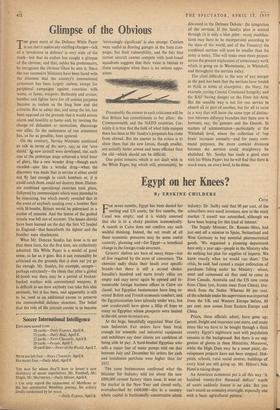Glimpse of the Obvious
IHE great merit of the Defence White Paper is not that it makes any startling changes—talk of a 'revolution in defence' is very wide of the mark—but that its author has caught a glimpse of the obvious; and that, unlike his predecessors, he recognises the obvious 'when he sees it. Since the war successive Ministers have been faced with the dilemma that the country's conventional armament has been largely useless, except for peripheral campaigns against countries with worse, or fewer, weapons. Battleship and cruiser, bomber and fighter have for all serious purposes become as useless as the long bow and the culverin. But to admit this, and scrap the lot, has been opposed on the grounds that it would arouse alarm and hostility at home and, by inviting the charge of defeatism or neutralism, discourage our allies. So the uselessness of our armament has, as far as possible, been ignored.
On the contrary, Service Ministers continued to talk in terms of the navy, say, as our 'sure shield.' t s new aircraft were developed, too, each , one at the prototype stage achieved a brief hour of glory, like a new wonder drug—though each receded-7also like a wonder drug—when the discovery was made that in service it either could not fly fast enough to catch bombers or, if it could catch them, could not destroy them. Elabor- ate combined operational exercises took place, followed by communiqués which were intended to be reassuring, but which merely revealed that in the event of anybody sending over a bomber fleet with H-bombs, Britain would be pulverised in a matter of minutes. And the lesson of the guided missile was left out of account. The lesson should have been learned on the day the first V2 landed in England—that henceforth the fighter and the bomber were obsolescent.
What Mr. Duncan Sandys has done is to see that these facts, for the first time, are collectively admitted. His White Paper is a model of good sense, as far as it goes. But it can reasonably be criticised on the grounds that it does not yet go far enough. Mr. Sandys, for example, accepts— perhaps reluctantly—the thesis that after a global H-bomb war there may be a period of broken- backed warfare with conventional weapons. It is difficult to see how anybody can take this idea seriously, but it has been, and apparently is still to be, used as an additional excuse to preserve the conventional defence structure. The belief that the role of the aircraft carrier is to become `increasingly significant' is also strange. Carriers were useful as floating garages in the Suez cam- paign; but their vulnerability, and the fact that carrier aircraft cannot compete with land-based squadrons suggests that their value is limited to those campaigns when there is no serious oppo- sition.
Presumably the answer to such criticisms will be that Britain has commitments to her allies : the Commonwealth and the NATO countries. Cer- tainly it is true that the bulk of what little rumpus there has been to Mr. Sandys's proposals has come from abroad. But the answer to the critics is to show them that the new forces, though smaller, are actually better armed and more efficient than the old—which should not be difficult.
One point remains which is not dealt with in the White Paper, but which will, presumably, be discussed in the Defence Debate : the integration of the services. If the Sandys plan is carried through (it is only a blue print : many modifica- tions may have to be incorporated according to the state of the world, and of the Treasury) the combined services will soon be smaller than the army is today. This will make even more prepos- terous the present triplication of unnecessary work which is going on in Westminster, in Whitehall, and throughout the services today.
The chief difficulty in the way of any merger in the past has been that the services have tended to think in terms of absorption : the Navy, for example, .eyeing Coastal Command hungrily; and the RAF 'having designs on the Fleet Air Arm. But the sensible way is not for one service to absorb all or part of another, but for all to unite in a way that will leave the same type of distinc- tion between different branches that there now is between, say, the gunners and the Guards. In matters of administration—particularly at the Whitehall level, where the collection of lop brass' increases annually—and for many com- mand purposes, the more comical divisions between the services could straightway be abolished. Mr. Sandys has made a good start with his White Paper; but he will find that there is much more, on every level, to be dbne.


































 Previous page
Previous page